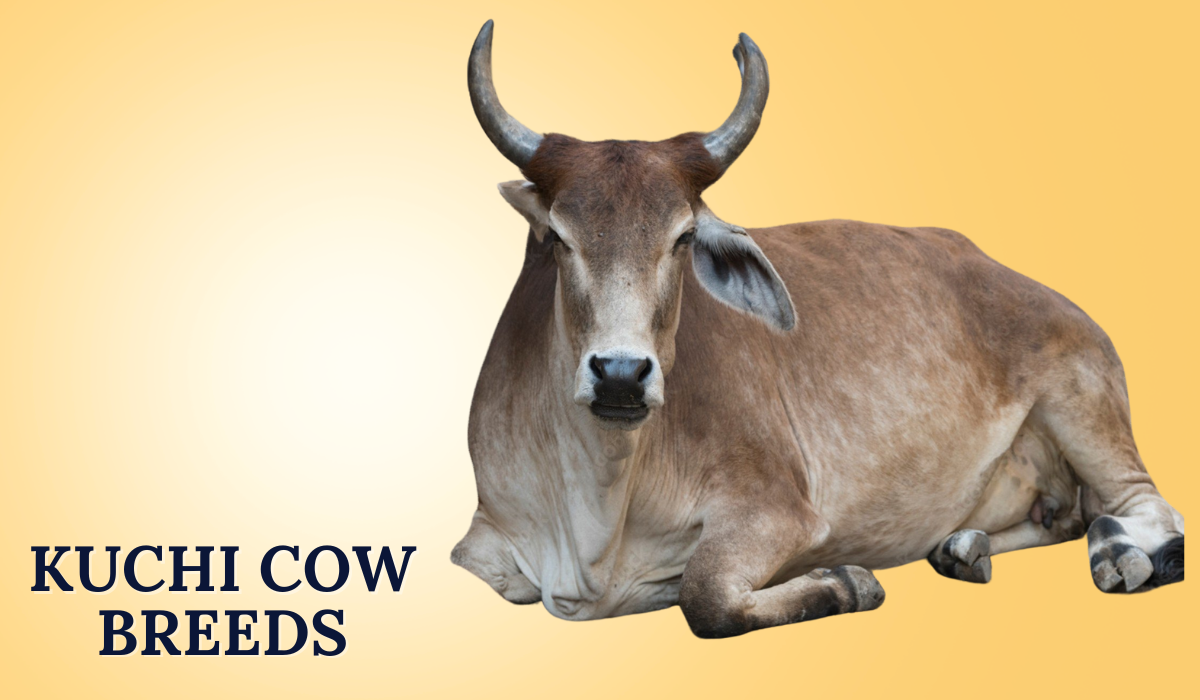Kuchi Cow Breeds In India
Kuchi Cow Breeds In India are a hardy and resilient indigenous breed, primarily found in the arid regions of Rajasthan, Gujarat, and parts of Maharashtra. Known for their adaptability to harsh climate
Aditya Pandey

Kuchi Cow Breeds In India are a hardy and resilient indigenous breed, primarily found in the arid regions of Rajasthan, Gujarat, and parts of Maharashtra. Known for their adaptability to harsh climates, these cows are well-suited for dry and semi-dry environments. They are typically used for milk production and draught purposes, making them an integral part of rural agriculture. The Kuchi Cow Breeds In India are medium-sized animals, with a strong and robust physique, able to endure extreme weather conditions while requiring minimal care compared to other breeds.
One of the key characteristics of the Kuchi Cow Breeds In India is their milk yield, which is relatively moderate but highly nutritious, contributing to the local dairy economy. These cows are also valued for their resistance to diseases, making them a preferred choice among farmers in less fertile areas. The breed’s ability to graze on sparse vegetation and its low maintenance make it an economically viable option for farmers with limited resources. The Kuchi Cow Breeds In India thus plays a significant role in sustaining the livelihoods of farmers in rural areas, while also preserving traditional livestock farming practices.
Origins and Characteristics of Kuchi Cows
The Kuchi Cow Breeds in Gujarat have deep roots in the rural agricultural practices of Gujarat, where they have been raised for centuries. Traditionally, these cows were used for draught purposes, aiding farmers in plowing fields and transporting goods. Over time, they have also become valued for their high-quality milk production, making them a versatile breed for both labor and dairy.
Physically, Kuchi cows are medium-sized with a sturdy, muscular body built for strength and endurance. Their coat is typically a reddish-brown or light gray, and they have strong legs and a large hump. Known for their hardiness, Kuchi cows can endure the extreme temperatures and dry conditions of Gujarat without significant health issues. These cows are primarily kept by farmers in rural areas due to their efficiency in multiple tasks, including milk production.
Milk Production and Benefits of Kuchi Cows
The Kuchi Cow Breeds Milk Per Day can range from 6 to 10 liters, depending on various factors such as age, health, and care. While they may not produce as much milk as some hybrid or high-yield breeds, the milk they produce is rich in nutrients and fat. This makes it highly sought after for making dairy products like ghee, curd, and butter.
In terms of Kuchi Cow Breeds Milk Price Per Litre in India, it generally falls between Rs. 30 and Rs. 45 per liter, depending on the market and region. The Kuchi Cow Breeds Milk Price Per Kg is also quite competitive, offering good value due to its rich fat content. Kuchi Cow Breeds Milk Benefits include improved digestion, stronger immunity, and better skin health, making it a preferred choice for many in rural areas.
Furthermore, Kuchi Cow Breeds Milk Benefits for Male are notable, as the milk is believed to help improve vitality and strength, especially for individuals who engage in physically demanding tasks. Kuchi Cow Breeds Benefits for Skin are also well-recognized, with many local remedies using Kuchi milk to treat skin conditions and maintain healthy, glowing skin.
Health and Disease Resistance in Kuchi Cows
Kuchi cows are known for their disease resistance, which is a significant reason for their popularity in regions with harsh environmental conditions. These cows are less susceptible to many common cattle diseases and require minimal medical intervention. However, they can still be prone to certain ailments like mastitis, foot-and-mouth disease, and parasites, which can affect their milk production.
Kuchi Cow Breeds Disease management involves regular health check-ups, vaccinations, and proper nutrition. Farmers who raise Kuchi cows focus on providing a clean environment, as well as deworming and vaccinating their herds to prevent disease outbreaks. This proactive care helps maintain the overall health of the cows, ensuring steady milk production and reducing the risk of disease-related issues.
Reproduction and Pregnancy in Kuchi Cows
The Kuchi Cow Breeds Pregnancy lasts for approximately nine months, like most other cattle breeds. Reproductive management in Kuchi cows involves careful selection of breeding pairs to maintain the quality of milk and to produce healthy calves. Proper care during pregnancy ensures that the cows deliver healthy calves that can be either raised for milk production or used for draught work.
Kuchi Cow Breeds Babies are typically born strong and healthy, with good growth potential. Calves are usually weaned after a few months, and they are raised with proper care to ensure they reach their full potential as either milk producers or working animals.
Kuchi Cow Donation and Cultural Significance
In Gujarat, Kuchi Cow Breeds Donation is a common practice, especially during religious festivals and charitable events. Donating cows is considered an act of goodwill, and many people donate Kuchi cows to temples or individuals in need. These cows are valued not only for their milk production but also for their role in improving the agricultural practices of the community.
Kuchi Breeds for Milk have significant cultural importance in rural Gujarat. The milk of these cows is often seen as a vital part of the local diet, contributing to the overall health of the community. The cows are also valued for their strength and resilience, making them indispensable to rural farming families who rely on them for both dairy and draught purposes.
Pricing and Market Value of Kuchi Cows
The Kuchi Cow Breeds Price Under 50000 can vary depending on factors such as age, health, and milk-producing potential. Typically, younger cows or cows with lower milk yields may cost less, while those with higher milk production and better physical characteristics can fetch higher prices. On average, the cost of a Kuchi cow may range between Rs. 20,000 to Rs. 50,000, depending on the market demand and region.
In urban markets, where commercial dairy farming is more prevalent, Kuchi cows might be priced lower due to competition from other high-yield breeds. Despite these variations, the Kuchi cow remains a crucial breed in India's agricultural and dairy landscape, offering farmers a reliable source of income and sustainability.
Conclusion : The Cow Breeds In India are a vital part of the agricultural and dairy sectors in India. Known for their hardiness, strong milk production, and resistance to diseases, Kuchi cows provide numerous benefits to farmers and local communities. With Kuchi Cow Breeds Milk Benefits, Kuchi Breeds for Milk, and their role in traditional practices, these cows continue to hold cultural and economic significance in Gujarat.
Farmers and breeders interested in raising Kuchi cows should consider their multi-purpose value—milk production, strength for agricultural work, and resistance to diseases. Whether for personal use or commercial dairy farming, the Kuchi cow remains a prized asset in rural Gujarat.
